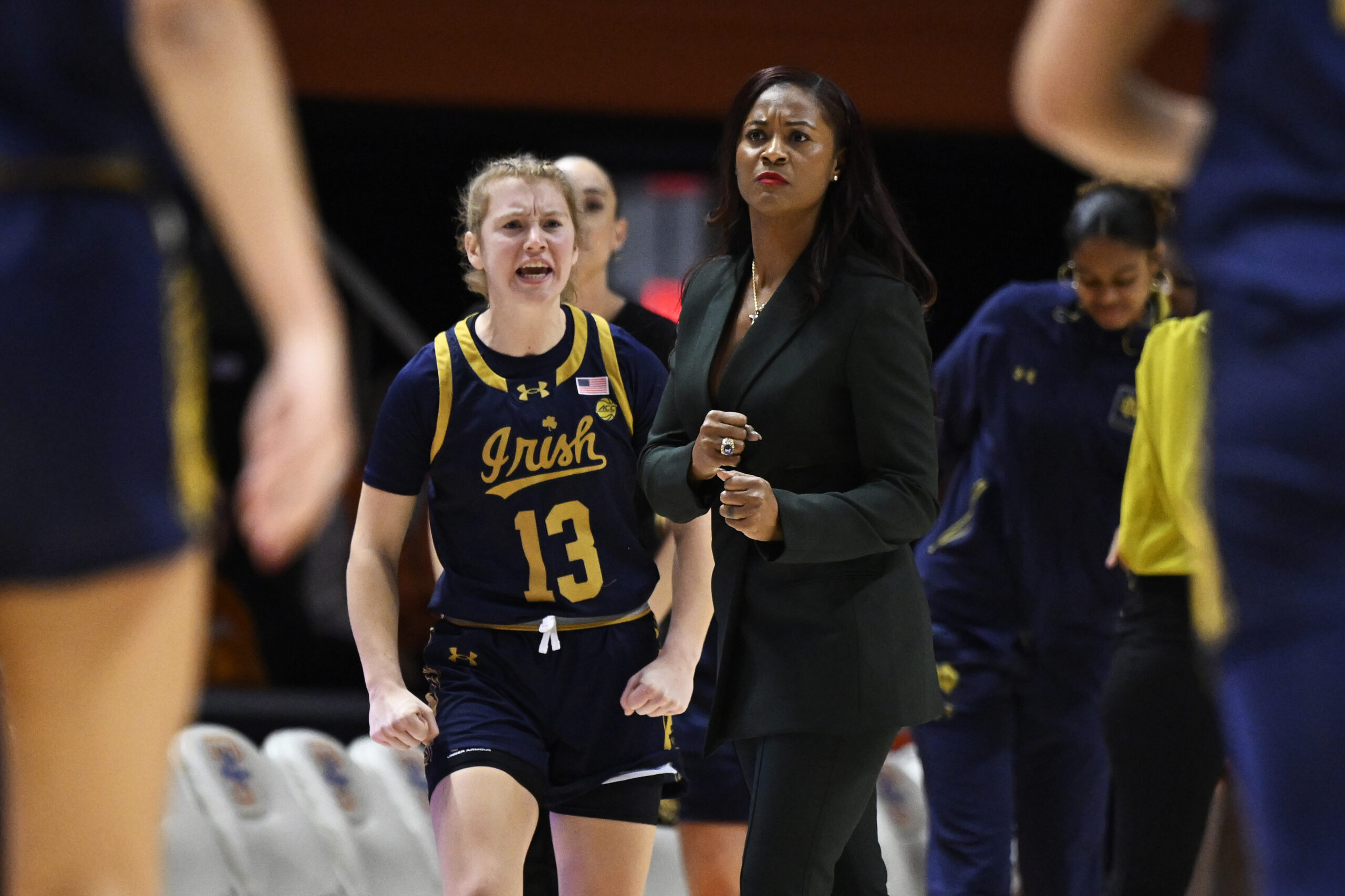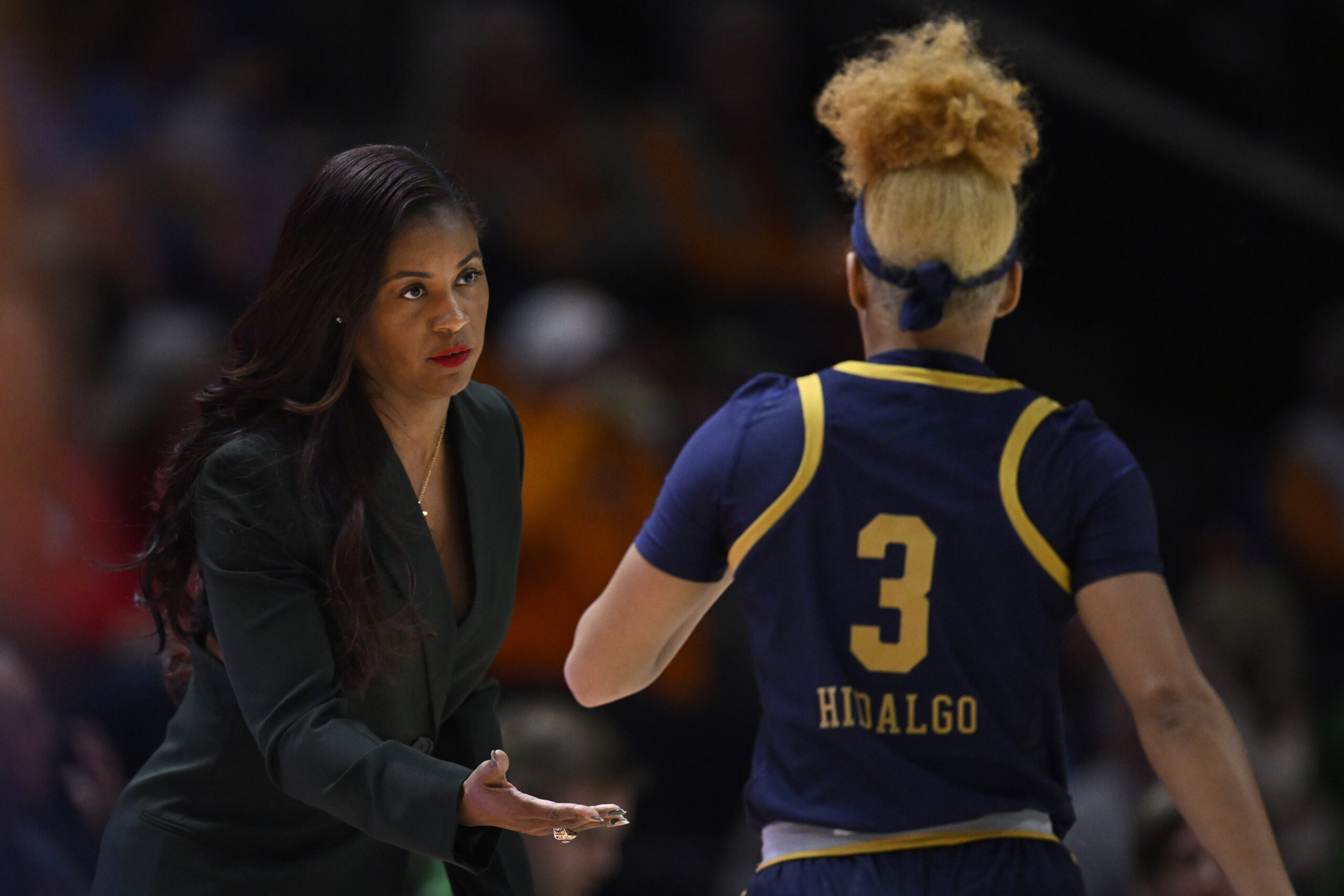SOUTH BEND, Ind. – Niele Ivey calls it her favorite place on the Notre Dame campus.
On a graciously temperate December afternoon in South Bend, Indiana, Ivey exits Purcell Pavilion, where she just wrapped up practice with the women’s basketball team, to make her way across campus to the Grotto of Our Lady of Lourdes – a replica of the French shrine. The Grotto has stood since 1896 and served the Catholic university as a place of prayer.
It’s a trip Ivey has made hundreds of times over the two decades she has spent on campus grounds – first as a player where she was a part of the Irish’s first ever national championship in 2001, then later as an assistant coach where she’d be a key part of an Irish program that made seven Final Fours in a nine-season span, winning a national championship in 2018.
Now, as the head coach, those walks are filled with reflections of years past.
“So many wonderful memories. I’ve had celebratory moments where I was excited to get back with my teammates and then sometimes it was hard moments,” Ivey said. “I had two ACL injuries, so coming back from rehab and having long days where I wasn’t too happy. In those moments, I would always take this path to the Grotto. That was my place of peace.”
In her fourth season as the head coach of the Fighting Irish, Ivey has continued Notre Dame’s upward ascent, returning the program back to contention for a national championship. Ivey’s success as a head coach is the latest chapter defined by patience and perseverance.
As a figure so ingrained in the fabric and history of the Notre Dame program, she’s ready to make history of her own as its leader.
Andy Mead/YCJ/Icon Sportswire via Getty Images
When Ivey was named the head coach of Notre Dame in April 2020, she stepped into arguably one of the most difficult positions for a first-year head coach.
She was the chosen successor of legendary head coach Muffet McGraw, who in 33 seasons established the program as a powerhouse in college basketball. She’d also have to manage the challenges that came with the coronavirus pandemic, still in its early stages. Her introductory press conference and first meetings with her team would take place via Zoom.
“The first Zooms I was like OK, I’m the face now. I’m doing the media, I’m doing all that kind of stuff and I’m explaining my vision and what it’s going to look like under me instead of under coach McGraw,” Ivey said.
In later months, she’d navigate the nationwide social justice movement following the police killings of George Floyd and Breonna Taylor. Ivey’s hiring also made her the first Black woman coach in Notre Dame athletics history. At the time, Ivey was the only Black head coach at the university.
In McGraw’s final season, the Fighting Irish had their first losing season in almost 30 years. It was on Ivey to stabilize the program. Ivey, however, was ready for what lay ahead. She had waited patiently for her opportunity to lead a team, serving as an assistant and associate head coach for 13 seasons.
While she didn’t think her first opportunity would be at her alma mater, when she was given the opportunity, her excitement to pilot a program outweighed any challenge or expectations.
“I felt like I was prepared for it,” Ivey said. “Nobody was prepared for the pandemic or the time of the social injustice. … No matter the challenges that I was facing, I was just like I’m going to be strong, rely on my work ethic, rely on my faith and just trusting myself and my vision for the program. Whatever presented itself I thought I was just going to attack this, whatever that is today, then continue to grow.”

Eakin Howard/Getty Images
Adaptation has been a strength of Ivey’s during her Notre Dame tenure. Sometimes it’s larger adaptations like having to reconstruct her player rotations prior to the start of last year’s postseason after losing her starting backcourt to injury – and still making it to the Sweet 16. Other times they are smaller, in-game adaptations like this season against Tennessee. Following a 16-point halftime deficit, Ivey orchestrated a comeback to defeat the Volunteers on the road.
When Ivey is confronted with those moments which require her to act, she leans on past life experiences that have equipped her to tackle any barrier.
“My whole story, my whole journey, it’s never been easy for me,” Ivey said. “I feel like I was always an underdog. [I] Wasn’t highly ranked coming out of high school. Had to go through two ACL injuries. Being a single parent. I’ve lost a brother. I’ve had to go through a lot, had a lot of challenges and struggles that I’ve learned from and grown from.
“Basketball is just a sport and I understand that. This for me is my passion and my purpose. I try to keep life in perspective. … My strength comes from those experiences.”
After finishing her first season 10-10, Ivey hit her stride as a head coach. In the next two seasons, Notre Dame finished 24-10 and 27-6, respectively – both seasons ending with an appearance in the Sweet 16. Last season, Ivey became the first Black coach to win an ACC regular-season title.
“None of this is surprising,” said Devereaux Peters, who played for Notre Dame from 2007 to 2012. “You knew it was going to happen if you know Niele because she just works. It was just a matter of time for her to get her footing here and be able to build.”
Ivey is facing more challenges this season as her team is battling multiple injuries. All-American junior point guard Olivia Miles continues to recover from the ACL tear she sustained last season. Junior guard Sonia Citron, who led the team in scoring a year ago, has missed seven games with a knee injury. The team has also played its last four games without sophomore guard Cassandre Prosper. Despite that, the Fighting Irish enter conference play Sunday with a 9-1 record.
Ivey described this year’s team as a close-knit and competitive group.
“I feel like we play with an edge to us,” Ivey said.

Eakin Howard/Getty Images
The Fighting Irish are led by freshman point guard Hannah Hidalgo, a tantalizing two-way player who has already emerged as one of the best talents in the country. Hidalgo’s eventual pairing with Miles in the Notre Dame backcourt could create one of the most dominant duos in college basketball.
“To have those two generational talents together I think it’s going to be something women’s college basketball has never seen before,” Ivey said.
Ivey’s motivation as a head coach is derived from a deep sense of gratitude that she holds for a team and program that has impacted her life well beyond basketball. Reciprocally, walking around any crevice of a Notre Dame basketball facility will reveal in images, banners and hardware the profound impact Ivey herself has had on the university – which will only grow as she continues to steer the storied program into a new era.
“I’ve always felt coaching was my purpose,” Ivey said. “In this role, I don’t feel like this is work. I get a chance to impact young women and mentor them just as I was mentored. I’m grateful that I get a chance to do that.
“I want them to experience what I experienced. I was fortunate to be the first national champion here so I’m hoping that they get a chance to experience that because it’s life-changing.”



